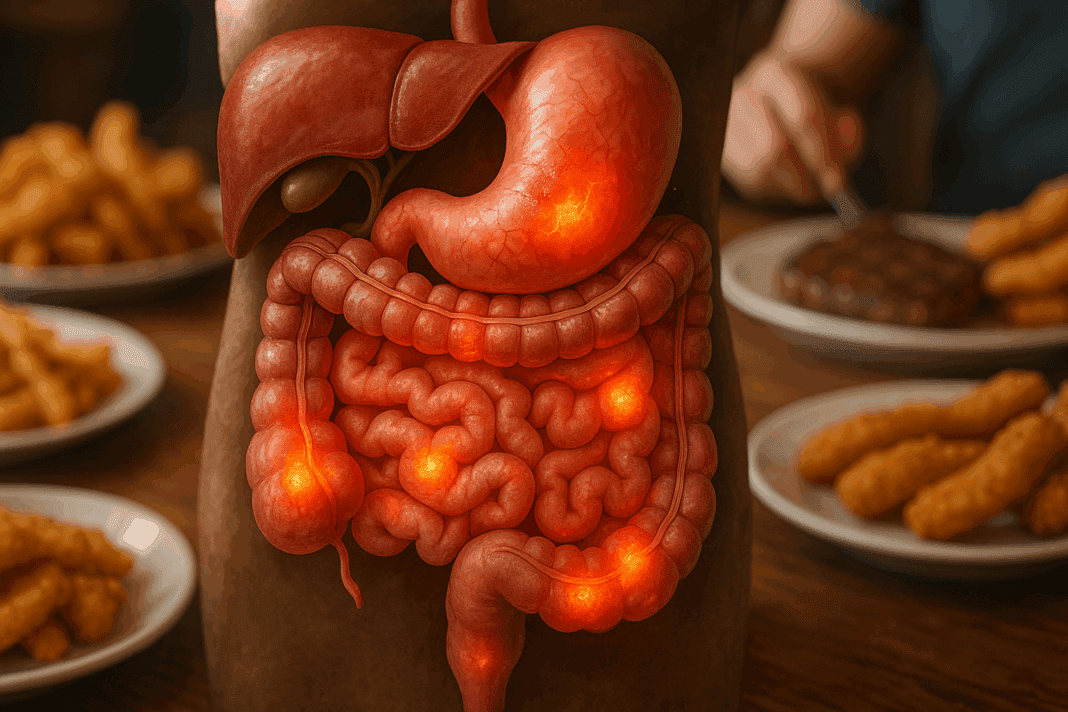The modern understanding of digestive health continues to evolve as researchers explore how different macronutrients influence gastrointestinal function. Among these, dietary fats play a complex role. While essential for health in appropriate amounts, excessive fat intake has been linked to a range of digestive disturbances and systemic health consequences. This article explores how fats, especially in excess, negatively impact digestion in humans and animals, using evidence-based insight to guide readers toward better nutritional choices.
You may also like: Macronutrients vs Micronutrients: What the Simple Definition of Macronutrients Reveals About Your Diet and Health
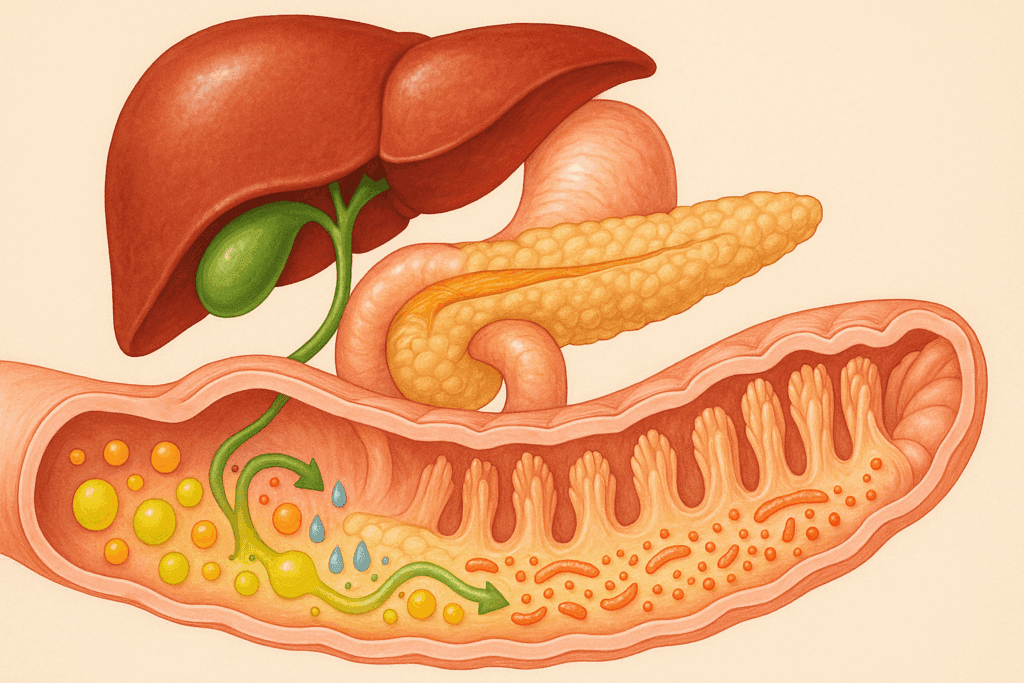
Understanding the Role of Fats in Normal Digestion
To grasp how fats can negatively impact digestion, it’s first essential to understand their normal role within the digestive process. Fats, primarily composed of triglycerides, serve as a dense energy source and facilitate the absorption of fat-soluble vitamins such as A, D, E, and K. During digestion, bile acids from the liver emulsify fats, and pancreatic lipase breaks them down into fatty acids and monoglycerides, which are absorbed in the small intestine. When consumed in moderation and as part of a balanced meal, fats support satiety and metabolic health.
However, the body’s ability to digest fats efficiently hinges on a delicate coordination between digestive organs. Disruptions in this coordination—whether due to disease, enzyme insufficiency, or overconsumption of fats—can contribute to a range of digestive complaints. Recognizing how these disruptions occur is the first step toward understanding how fats negatively impact digestion.
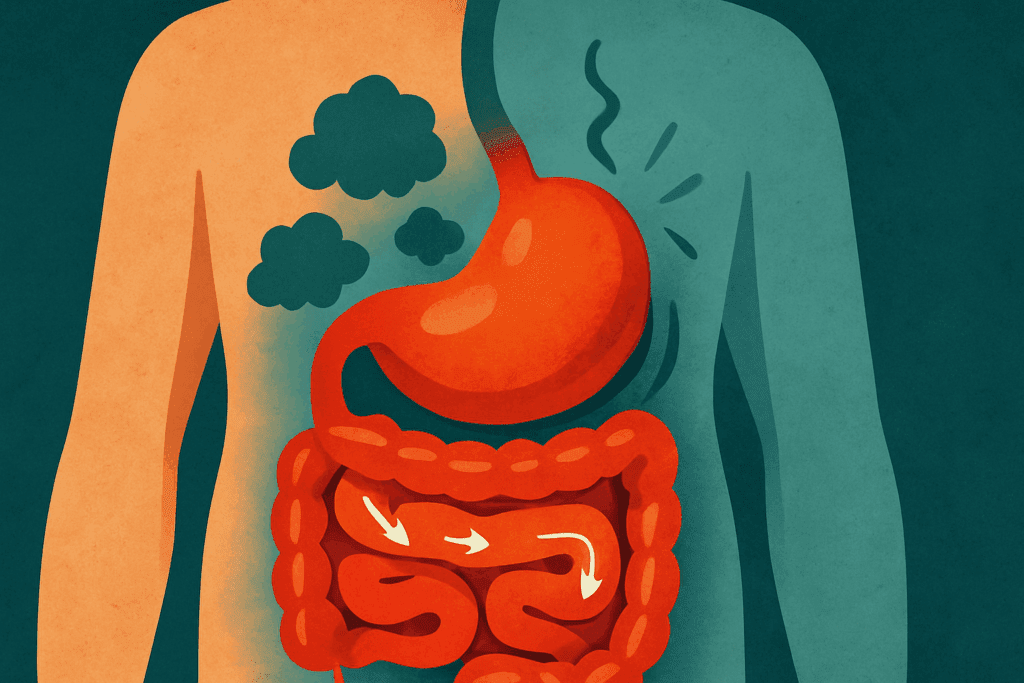
The Consequences of Excessive Fat Intake on Human Digestion
When dietary fat intake exceeds the body’s digestive capacity, a cascade of complications may ensue. For instance, the presence of high fat levels in the stomach can slow gastric emptying. This delay not only prolongs the feeling of fullness but may also contribute to bloating, nausea, and indigestion. In some individuals, particularly those with conditions like functional dyspepsia or gastroparesis, high-fat meals can exacerbate symptoms significantly.
Excess fat also places a heavy demand on bile production. The liver, tasked with producing bile to emulsify fats, may struggle to keep up when dietary fat intake becomes excessive. This can lead to incomplete fat digestion, resulting in undigested fat reaching the colon—a condition that can manifest as steatorrhea, characterized by greasy, foul-smelling stools. In chronic cases, this malabsorption can interfere with the absorption of fat-soluble vitamins, leading to deficiencies despite adequate dietary intake.
Moreover, the pancreas is required to release significant amounts of lipase to digest dietary fat. In conditions where pancreatic function is compromised, such as in chronic pancreatitis, the inability to handle excess fats becomes more pronounced, further impairing digestion. These physiological mechanisms underscore why understanding how fats negatively impact digestion is critical for individuals with digestive disorders or those at risk.
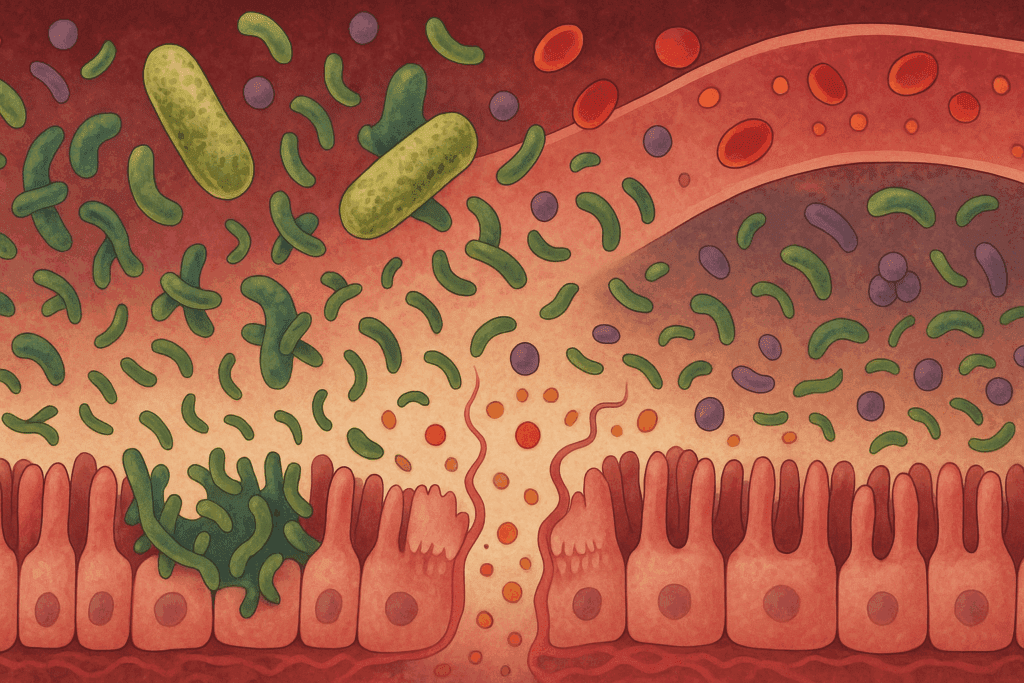
Fat-Induced Inflammation and Its Impact on the Gut
Beyond mechanical disruptions, excessive fat consumption—particularly from saturated fats—has been shown to promote inflammation within the gastrointestinal tract. Chronic inflammation alters the intestinal environment and disrupts the balance of gut microbiota. Research indicates that high-fat diets can shift microbial populations in ways that reduce the production of beneficial short-chain fatty acids, which support colonocyte health and reduce inflammation.
This inflammatory cascade can also increase intestinal permeability, often referred to as “leaky gut.” When the intestinal barrier is compromised, endotoxins and partially digested food particles may enter the bloodstream, provoking systemic immune responses. This phenomenon illustrates another layer in the explanation of how fats negatively impact digestion: not only do they create mechanical strain, but they can also destabilize the integrity of the gut lining.
Furthermore, the interaction between fat and gut microbiota has broader implications. Diets high in animal fats, for instance, have been linked to the overgrowth of bile-tolerant bacteria like Bilophila wadsworthia, which have been implicated in inflammatory bowel diseases. These microbial shifts contribute to both short-term digestive discomfort and long-term risks for gastrointestinal disorders.
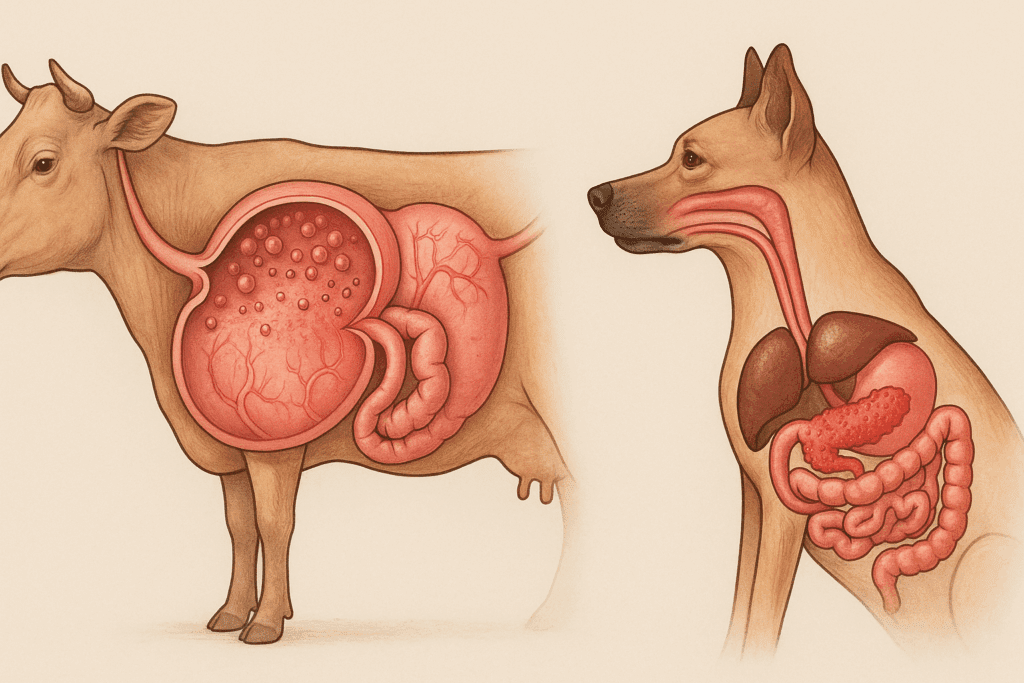
How Can Excessive Fats Negatively Impact Animal Digestion?
Understanding how excessive fats negatively impact animal digestion offers valuable insights into comparative digestive physiology and nutrition. In livestock and companion animals, diets high in fat can lead to gastrointestinal distress, malabsorption, and metabolic dysfunction. For example, ruminants such as cows have complex stomach systems adapted for high-fiber, low-fat diets. Introducing large quantities of fat into their feed can disrupt microbial fermentation in the rumen, resulting in reduced feed efficiency and altered nutrient absorption.
In non-ruminant animals, such as pigs and dogs, the pancreas plays a central role in fat digestion. Overfeeding fat-rich foods can lead to pancreatitis, a painful and potentially life-threatening condition. Clinical signs often include vomiting, abdominal pain, and diarrhea. These symptoms illustrate how fats negatively impact digestion when consumed excessively and when they overwhelm the animal’s digestive capabilities.
Even in controlled laboratory settings, high-fat diets have been shown to negatively alter gut microbiota composition in rodents, leading to increased gut permeability and inflammation. These findings are not merely academic; they reinforce the principle that digestive systems across species are finely tuned to handle specific nutrient ratios. Disrupting these balances, especially through excessive fat intake, reveals how fats negatively impact digestion in both humans and animals.
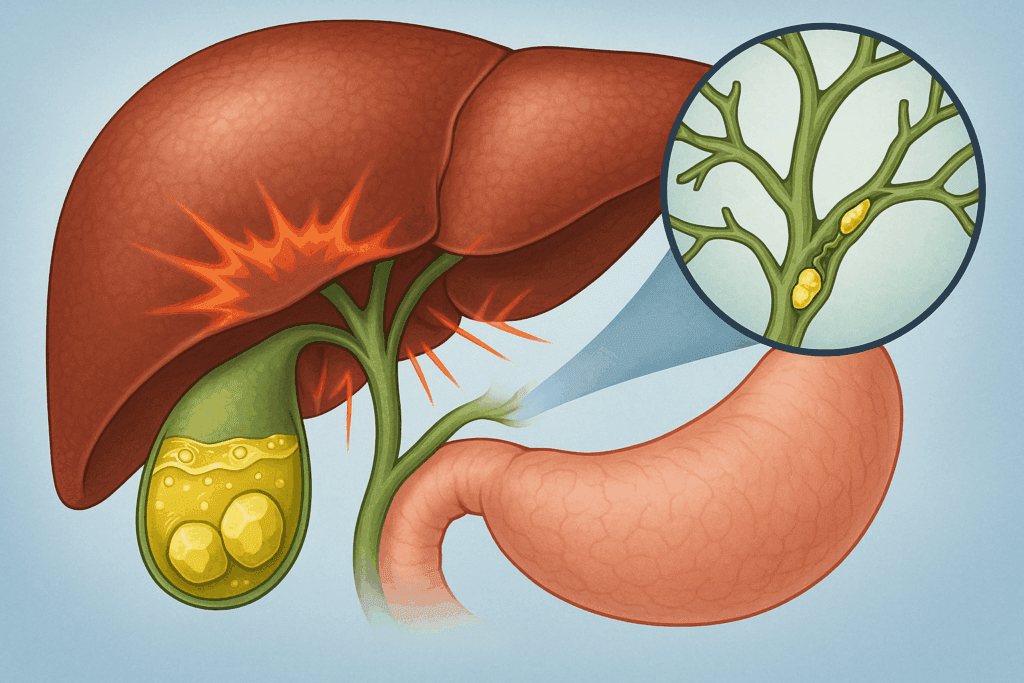
Bile Overproduction and Gallbladder Stress
The gallbladder plays a crucial role in fat digestion by storing and concentrating bile, which is released during meals to emulsify dietary fat. Chronic consumption of high-fat diets can lead to overstimulation of the gallbladder. Over time, this overstimulation may contribute to gallstone formation, particularly in individuals predisposed to bile cholesterol supersaturation. Gallstones can block bile flow, leading to biliary colic, cholangitis, or even pancreatitis.
When bile secretion becomes dysregulated, digestion efficiency diminishes. Instead of being released in synchrony with meals, bile may leak inappropriately or be insufficiently secreted when needed. This inefficiency reinforces the theme of how fats negatively impact digestion by destabilizing the coordinated efforts of digestive organs.
In individuals without a gallbladder—either due to surgical removal or congenital absence—the impact of dietary fats becomes even more pronounced. Without the storage reservoir that regulates bile flow, fats must be consumed cautiously and in smaller quantities to avoid overwhelming the liver’s continuous but less efficient bile production.
The Impact of Fats on Gut Hormones and Motility
Fats are powerful modulators of digestive hormones. When fat enters the small intestine, it stimulates the release of cholecystokinin (CCK), a hormone that slows gastric emptying and signals satiety to the brain. While this hormonal response is beneficial in moderation, an excessive release of CCK from high-fat meals can contribute to dyspeptic symptoms such as bloating and discomfort.
Moreover, fats may influence the secretion of other gut-derived peptides, such as peptide YY and glucagon-like peptide-1 (GLP-1), which regulate motility and glucose homeostasis. When these hormones are secreted in excess, they may contribute to slowed intestinal transit, leading to constipation or irregular bowel patterns. This hormonal dysregulation further illustrates how fats negatively impact digestion beyond just enzyme activity and bile flow.
It is also important to recognize that individuals with irritable bowel syndrome (IBS) often report worsening symptoms after consuming high-fat meals. The interplay between fat-induced hormonal shifts and visceral hypersensitivity in IBS patients can amplify discomfort, making dietary fat moderation a cornerstone of symptom management.
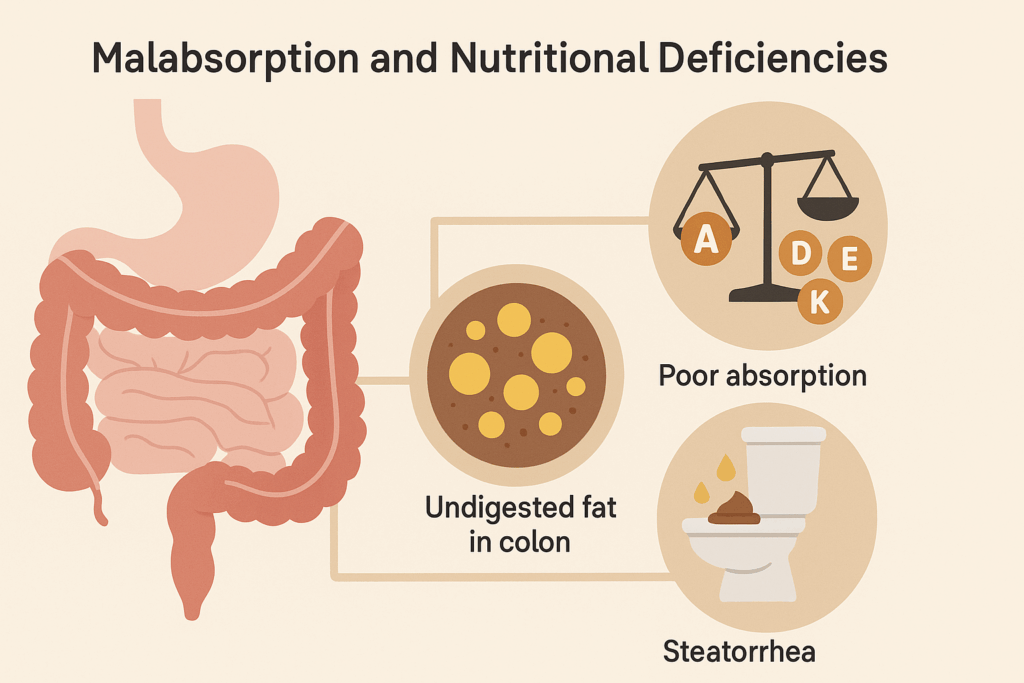
Malabsorption and Nutritional Deficiencies
When fats are not digested and absorbed efficiently, the downstream effects extend beyond gastrointestinal discomfort. One of the more clinically significant outcomes is the malabsorption of fat-soluble vitamins—A, D, E, and K. These vitamins play crucial roles in immune function, vision, bone health, and blood coagulation. In conditions like chronic pancreatitis or celiac disease, where fat absorption is impaired, patients may develop vitamin deficiencies despite adequate dietary intake.
Fat malabsorption also impacts overall caloric intake and energy balance. In patients with conditions such as short bowel syndrome or small intestinal bacterial overgrowth (SIBO), the inability to properly absorb fats can lead to unintended weight loss, fatigue, and metabolic imbalances. In pediatric populations, this can hinder growth and development, emphasizing the need for careful dietary management.
From a preventive perspective, recognizing how fats negatively impact digestion at the nutrient absorption level underscores the importance of balanced dietary composition. Health professionals often recommend smaller, more frequent meals with moderate fat content to reduce the risk of malabsorption and its associated complications.
How Can Excessive Fats Negatively Impact Animal Digestion in Agricultural Settings?
In agricultural settings, managing the fat content of feed is essential for animal productivity and welfare. For instance, poultry given diets with high saturated fat content have shown reduced nutrient digestibility and increased incidence of gastrointestinal diseases. These findings align with broader concerns regarding how excessive fats negatively impact animal digestion and, by extension, food safety and quality.
Fish farming provides another example. In aquaculture, excess dietary fat can result in hepatic lipidosis—a condition where fat accumulates in the liver—reducing the fish’s growth performance and increasing susceptibility to disease. These outcomes highlight the economic and ethical importance of understanding how fats negatively impact digestion in animals raised for food production.
Furthermore, researchers studying the effects of fat-rich diets in lab animals have observed behavioral changes linked to gut-brain axis disruptions. These observations support the emerging view that digestive health is intertwined with systemic well-being, making the control of dietary fat intake a priority not just for digestion, but for holistic health.
Practical Recommendations for Digestive Health
Given the diverse ways in which fats negatively impact digestion, moderation and dietary balance are crucial. Individuals can support digestive health by prioritizing unsaturated fats—such as those from nuts, seeds, avocados, and olive oil—while limiting trans fats and excessive saturated fats. Cooking methods also play a role; baked, grilled, or steamed foods typically contain less added fat than fried alternatives.
In clinical practice, dietary adjustments are often tailored to individual needs. For those with gallbladder disease, small, low-fat meals spaced throughout the day may help minimize symptoms. Patients with fat malabsorption conditions may benefit from enzyme supplementation, such as pancreatic lipase, or from using medium-chain triglycerides (MCTs), which are more readily absorbed.
For pet owners and animal caretakers, working with veterinarians and animal nutritionists to ensure species-appropriate fat content in diets can prevent gastrointestinal distress and chronic disease. Monitoring stool quality, weight, and energy levels in animals offers valuable feedback on how well their digestive systems are handling dietary fats.
Frequently Asked Questions (FAQ): How Fats Affect Digestive Health
1. Can fats interfere with the effectiveness of digestive enzymes?
Yes, excessive dietary fat can reduce the efficiency of digestive enzymes, particularly pancreatic lipase. When too much fat is consumed at once, the pancreas may struggle to produce sufficient enzymes for complete breakdown. This overload can result in partially digested lipids entering the intestines, contributing to discomfort and steatorrhea. Over time, this strain may weaken pancreatic responsiveness, further impairing digestion. Understanding how fats negatively impact digestion at the enzymatic level highlights the importance of moderated fat intake, especially in individuals with compromised pancreatic function.
2. What is the relationship between high-fat diets and small intestinal bacterial overgrowth (SIBO)?
Emerging research suggests that diets high in saturated fats can disrupt gut motility and create conditions favorable for bacterial overgrowth in the small intestine. This imbalance may slow peristalsis, allowing bacteria to colonize regions they usually do not inhabit. The metabolic byproducts of this bacterial activity often cause gas, bloating, and nutrient malabsorption. When exploring how fats negatively impact digestion, it becomes evident that their effect on microbial distribution is both systemic and clinically significant. This is particularly concerning for patients with chronic gastrointestinal symptoms or underlying dysbiosis.
3. Why do certain animals develop liver disorders on high-fat diets?
In both laboratory and domesticated animals, long-term exposure to fat-rich diets has been associated with hepatic lipidosis, or fatty liver disease. The liver, being central to fat metabolism, becomes burdened by the increased load of triglycerides. In species such as cats and certain fish, this condition can progress rapidly and lead to organ failure. This provides a compelling illustration of how excessive fats negatively impact animal digestion and metabolic health. Veterinary professionals often advocate for fat moderation in commercial animal feeds to prevent liver and gastrointestinal complications.
4. How do high-fat diets affect gut-brain signaling and appetite regulation?
High-fat meals strongly influence hormonal signaling pathways that control satiety and hunger. The overstimulation of hormones such as cholecystokinin (CCK) and peptide YY can desensitize their receptors over time, leading to dysregulated appetite control. This dysfunction may contribute to binge-eating behaviors or irregular feeding patterns. As part of the broader picture of how fats negatively impact digestion, it is crucial to consider their effect on neurohormonal feedback loops. These disruptions not only affect digestion but also influence weight gain, mood, and long-term dietary habits.
5. In what ways can excess fat alter intestinal immune responses?
A lesser-known consequence of high-fat diets is their ability to stimulate pro-inflammatory immune responses in the gut mucosa. Saturated fats, in particular, promote the release of cytokines and can reduce the expression of protective mucins. This inflammatory environment compromises the gut barrier, making it more permeable to antigens and toxins. When assessing how fats negatively impact digestion, the immune-modulating effects of lipids represent a vital yet often overlooked dimension. Inflammatory bowel conditions may be exacerbated by these dietary imbalances.
6. How can excessive fats negatively impact animal digestion in species with specialized diets?
Animals with specialized diets, such as herbivores, have digestive systems adapted for fiber-rich, low-fat nutrition. Introducing high-fat content disrupts fermentation processes in the gut microbiome, especially in ruminants like cows or deer. The altered microbial activity leads to decreased fiber digestion and reduced energy extraction. This is a clear example of how excessive fats negatively impact animal digestion by upsetting the microbial ecosystems these animals rely on. Nutritional mismanagement in such species can lead to weight loss, diarrhea, and even systemic illness.
7. Are there psychological effects associated with fat-induced digestive distress?
Yes, gastrointestinal discomfort caused by excessive fat intake can contribute to anxiety and depression through the gut-brain axis. Persistent bloating, pain, and irregular bowel movements may reduce quality of life and lead to food-related stress. Furthermore, chronic inflammation resulting from high-fat diets has been linked to mood disorders via cytokine signaling. This intersection of mental and digestive health underscores a broader understanding of how fats negatively impact digestion and psychological well-being simultaneously. Individuals with a history of disordered eating may be particularly sensitive to these effects.
8. How do excess fats interact with medications or supplements used for digestion?
Some digestive aids, including bile acid binders and enzyme supplements, function optimally only within certain fat thresholds. When dietary fat exceeds these limits, these interventions may become less effective or require dosage adjustments. Moreover, high-fat intake can interfere with the absorption of certain medications, especially fat-soluble drugs. Understanding how fats negatively impact digestion includes recognizing these pharmacological interactions. Patients managing gastrointestinal conditions often need tailored nutritional plans to prevent treatment disruptions.
9. Why is fat moderation important in the rehabilitation of rescued or malnourished animals?
In veterinary medicine and wildlife rehabilitation, gradually reintroducing fat into the diet is critical for safe recovery. Malnourished animals may experience refeeding syndrome if given high-fat diets too quickly, which can lead to organ stress and electrolyte imbalances. Additionally, their digestive systems are often too compromised to manage lipid processing efficiently. This highlights how excessive fats negatively impact animal digestion when introduced without proper transition. A stepwise, protein- and carbohydrate-focused diet is typically preferred in the early stages of recovery.
10. What innovations are emerging to mitigate the digestive impact of high-fat diets?
Innovations in nutritional science are increasingly focused on modifying the structure of dietary fats to make them more digestible. For example, structured lipids that mimic breast milk triglycerides are being developed to improve absorption in individuals with fat malabsorption syndromes. Probiotic and postbiotic therapies are also being explored to restore microbial balance disrupted by high-fat intake. These advancements represent a promising frontier in reducing how fats negatively impact digestion while preserving their nutritional value. The goal is to maintain metabolic benefits without overwhelming digestive function.
Conclusion: Why Understanding How Fats Negatively Impact Digestion Matters for Lifelong Health
From disrupting enzyme activity and bile flow to altering gut hormones and microbiota, the evidence is clear: excessive fat intake can significantly impair digestive function. Understanding how fats negatively impact digestion allows individuals, clinicians, and caregivers alike to make informed dietary choices that support long-term health. For those caring for animals, recognizing how excessive fats negatively impact animal digestion is equally critical for maintaining wellness and productivity.
Whether in the context of chronic human diseases or agricultural feeding practices, the role of dietary fat is a common thread influencing digestive outcomes. The key lies not in eliminating fats altogether, but in consuming them in forms and amounts that align with our physiological capacity to digest and benefit from them. With growing awareness of the gut’s central role in health, appreciating the delicate balance between nutrient intake and digestive resilience is more important than ever. Thoughtfully moderating fat consumption is not merely a dietary suggestion—it is a foundational aspect of preventive wellness and digestive harmony for both humans and animals alike.
Further Reading:
Negative Effects of a High-Fat Diet on Intestinal Permeability: A Review
Overview of Fat Digestion and Metabolism in Dairy Cows
The source of the fat significantly affects the results of high-fat diet intervention


